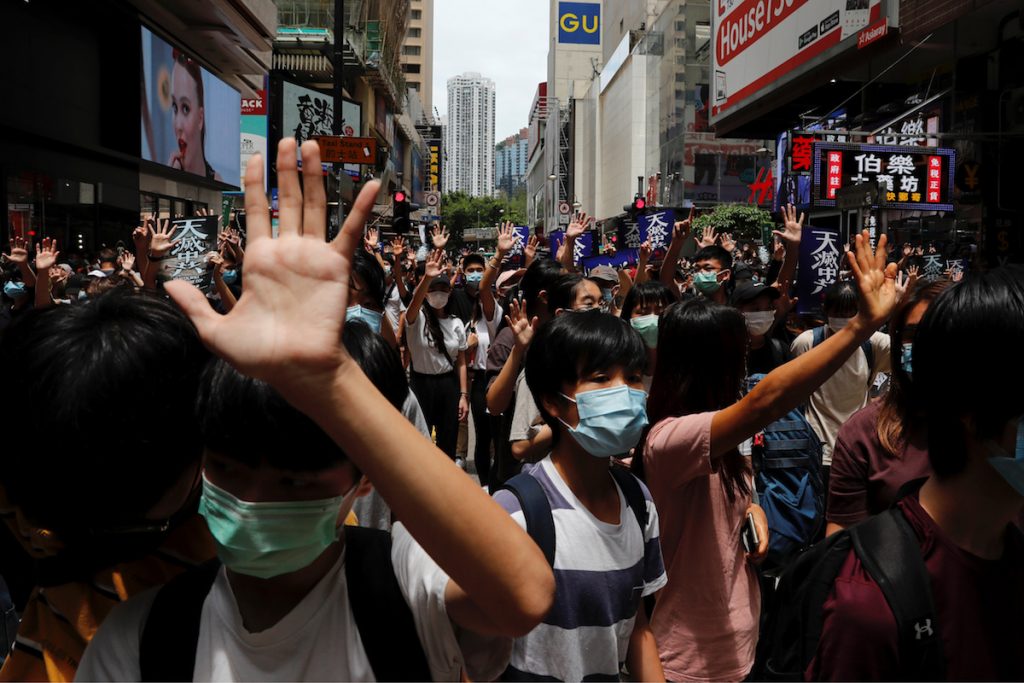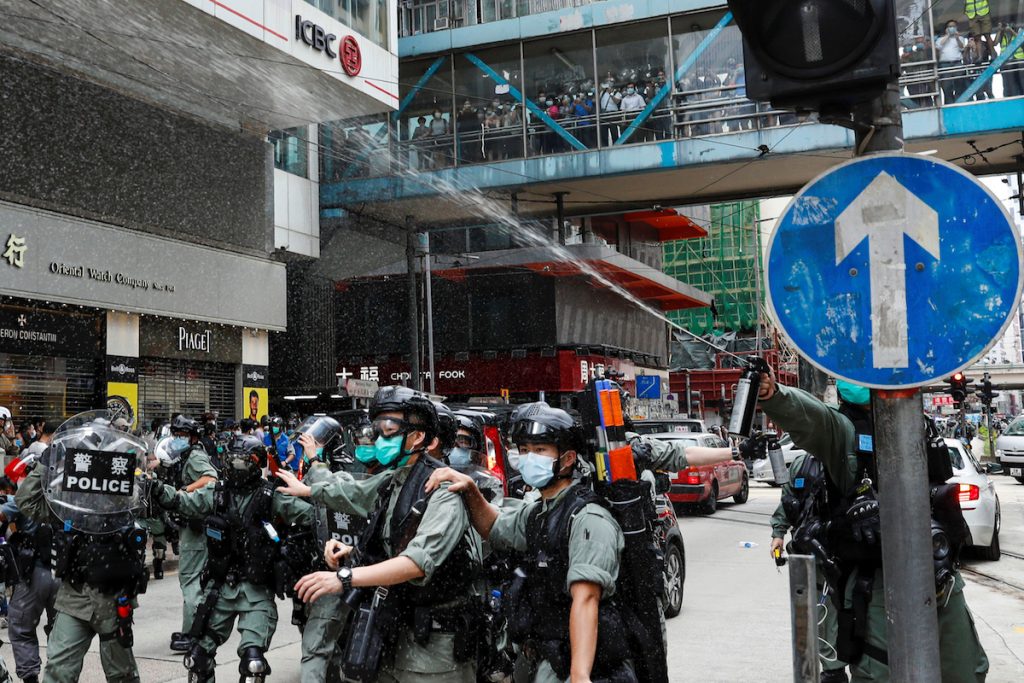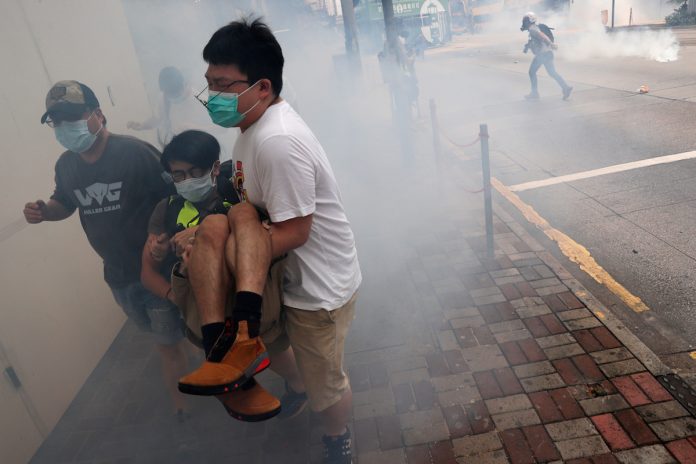Taiwan will provide the people of Hong Kong with “necessary assistance”, President Tsai Ing-wen said, after thousands in the Chinese ruled territory protested against Beijing’s plans to impose new national security laws.
Taiwan has become a refuge for a small but growing number of pro-democracy protesters fleeing Hong Kong, which has been convulsed since last year by anti-Beijing and anti-Hong Kong government protests.
Hong Kong police fired tear gas and water cannon to disperse thousands of people who rallied on May 24 to protest against Beijing’s move to introduce new national security laws.
Writing on her Facebook page late on May 24, Tsai said the proposed legislation was a serious threat to Hong Kong’s freedoms and judicial independence.
Bullets and repression are not the way to deal with the aspirations of Hong Kong’s people for freedom and democracy, she added.
“In face of the changing situation, the international community has proactively stretched out a helping hand to Hong Kong’s people,” Tsai wrote.
Taiwan will “even more proactively perfect and forge ahead with relevant support work, and provide Hong Kong’s people with necessary assistance,” she wrote.

Taiwan has no law on refugees that could be applied to Hong Kong protesters who seek asylum on the island. Its laws do promise, though, to help Hong Kong citizens whose safety and liberty are threatened for political reasons.
The number of Hong Kong immigrants to Taiwan jumped 150 percent to 2,383 in the first four months of 2020 from the same period last year, official data shows.
Johnny Chiang, chairman of Taiwan’s main opposition party, the Kuomintang, said Tsai’s government was vocal about support for Hong Kong on the election campaign trail but had failed to provide meaningful help since Tsai was re-elected in January.
“Don’t let ‘supporting Hong Kong’ only be a slogan of empty promises … Bring up your thoughts on legislation. Support Hong Kong with real actions,” Chiang said, referring to parliamentary bills to give political asylum for people from Hong Kong.
The small New Power Party also urged Tsai’s cabinet to establish a special task force to give “tangible assistance” to Hong Kong people.
The Hong Kong protests have won widespread sympathy in Taiwan, and the support for the protesters by Tsai and her administration have worsened already poor ties between Taipei and Beijing.
China has accused supporters of Taiwan independence of colluding with the protesters.
China believes Tsai to be a “separatist” bent on declaring the island’s formal independence. Tsai says Taiwan is already an independent country called the Republic of China, its official name.

Thousands protest
The reaction from Taiwan follows a return of the unrest that roiled Hong Kong last year, with crowds thronging the Causeway Bay shopping area on May 24 in defiance of curbs imposed to contain the coronavirus. Chants of “Hong Kong independence, the only way out,” echoed through the streets.
To Chinese Communist Party leaders, calls for independence for the semi-autonomous city are anathema and the proposed new national security framework stresses Beijing’s intent “to prevent, stop and punish” such acts.
As dusk fell, police and demonstrators faced off in the nightlife district of Wan Chai.
The day’s events pose a new challenge to Beijing’s authority as it struggles to tame public opposition to its tightening grip over Hong Kong, a trade and business gateway for mainland China.
The security laws have also worried financial markets and drawn a rebuke from foreign governments, human rights groups and some business lobbies.
“I am worried that after the implementation of the national security law, they will go after those being charged before and the police will be further out of control,” said Twinnie, 16, a secondary school student who declined to give her last name.
“I am afraid of being arrested but I still need to come out and protest for the future of Hong Kong.”
The demonstrations come amid concerns over the fate of the “one country, two systems” formula that has governed Hong Kong since the former British colony’s return to Chinese rule in 1997. The arrangement guarantees the city broad freedoms not seen on the mainland, including a free press and independent judiciary.
Sanctions?
Washington said on May 24 that China’s proposed legislation could lead to U.S. sanctions.
“It looks like, with this national security law, they’re going to basically take over Hong Kong and if they do … Secretary (of State Mike) Pompeo will likely be unable to certify that Hong Kong maintains a high degree of autonomy and if that happens there will be sanctions that will be imposed on Hong Kong and China,” National Security Adviser Robert O’Brien told NBC television.
As the city government sought to give reassurances over the new laws, police conducted stop-and-search operations in Causeway Bay and warned people not to violate a ban on gatherings of more than eight.
That restriction, imposed to contain the spread of coronavirus, has kept protesters largely off the streets in recent months.
Protesters set up road blocks and hurled umbrellas, water bottles and other objects, police said, adding that they responded with tear gas and made more than 120 arrests.
Many shops and other businesses closed early.
The scenes evoked memories of last year’s sometimes violent anti-government protests, which drew up to two million people in the biggest single protest.

‘We have to resist it’
A small group of democracy activists protested outside Beijing’s main representative office in the city, chanting: “National security law is destroying two systems.”
“In future they can arrest, lock up and silence anyone they want in the name of national security. We have to resist it,” protester Avery Ng of the League for Social Democrats told Reuters.
Nearly 200 political figures from around the world said in a statement the proposed laws were a “comprehensive assault on the city’s autonomy, rule of law and fundamental freedoms”.
China has dismissed foreign complaints as “meddling,” and said the proposed laws will not harm Hong Kong’s autonomy or investors.
Last year’s anti-government protests plunged Hong Kong into its biggest political crisis in decades, battered the economy, and posed the gravest popular challenge to President Xi Jinping since he came to power in 2012.









